
Virtual Briefings (Sways) are interactive presentations with audio that discusses the content of the slide. They cover locally identified areas of safeguarding risk and the Board’s priorities. Generally, they last around 20 minutes per briefing.
- All
- Assessment Tool
- CME
- CSA
- Child Exploitation
- Child Neglect
- Child Protection
- Child Sexual Abuse
- Children Missing Education
- Contextual Safeguarding
- Domestic Abuse
- FGM
- FII
- Fabricated and Induced Illness
- GCP
- Graded Care Profile
- Harmful Practices
- ICON
- Introduction
- LADO
- MARM
- Making Safeguarding Personal
- NRPF
- No Recourse to Public Funds
- Online Abuse
- Safeguarding Adults
- Safeguarding Children
- parental conflict
- sexual violence
- stalking


Fabricated and Induced Illness in Adults
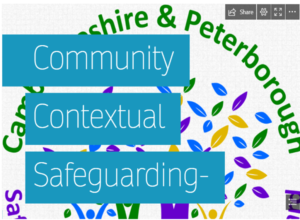
Community Contextual Safeguarding – Raising concerns about Spaces and Networks
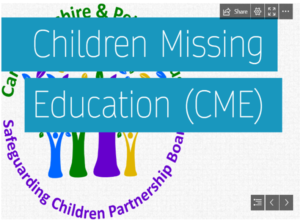
Children Missing Education
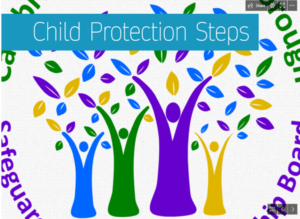
Child Protection Steps
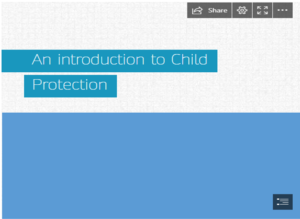
An Introduction to Child Protection Briefing
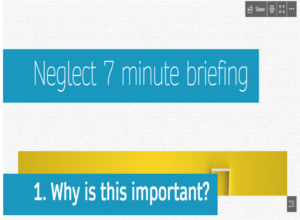
Child Neglect Briefing
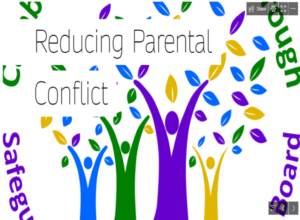
Reducing Parental Conflict
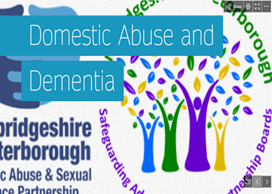
Domestic Abuse and Dementia
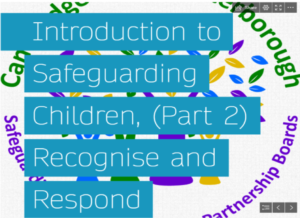
Introduction to Safeguarding Children (Part 2) – Recognise and Respond
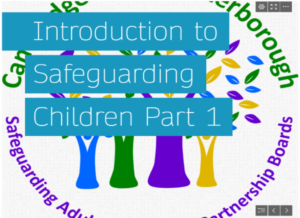
Introduction to Safeguarding Children (Part 1)
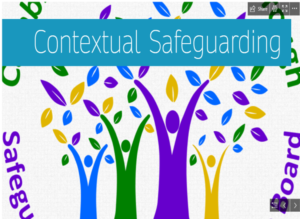
Contextual Safeguarding

What is the LADO?
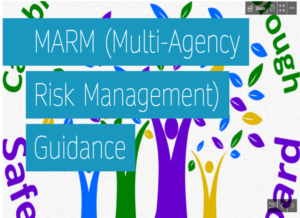
Multi-Agency Risk Management Guidance
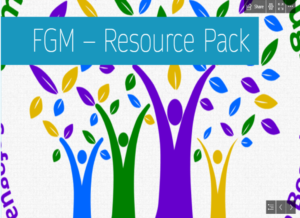
FGM Resource Pack
ICON – Support for New Parents

Completing a DASH Risk Indicator Checklist

Using Our Local Child Sexual Behaviour Assessment Tool
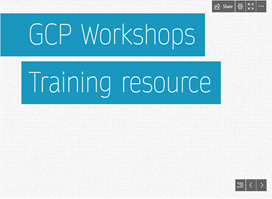
Graded Care Profile Workshops
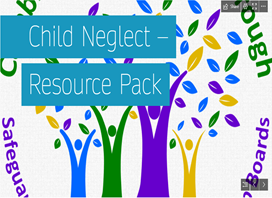
Child Neglect Resource Pack
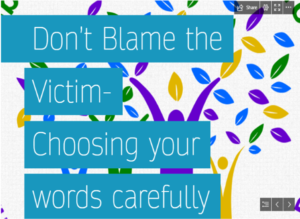
Don’t Blame the Victim
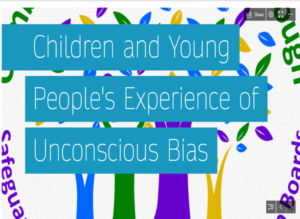
Children’s Experiences of Unconscious Bias
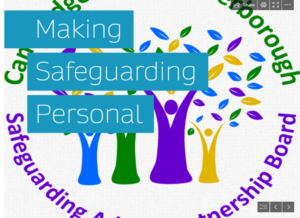
Making Safeguarding Personal
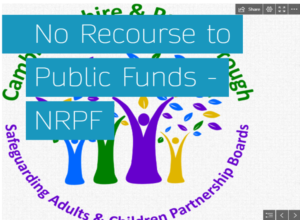
No Recourse to Public Funds
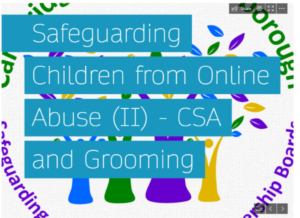
Safeguarding Children from Online Abuse (Part 2) – CSA and Grooming
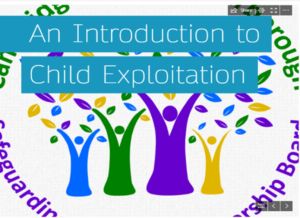
An Introduction to Child Exploitation
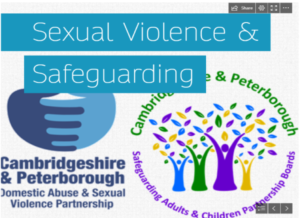
Sexual Violence and Safeguarding
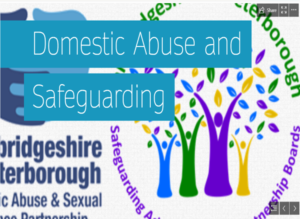
Domestic Abuse and Safeguarding
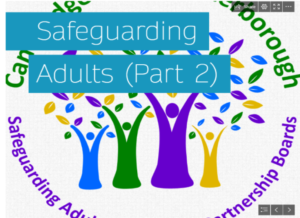
Introduction to Safeguarding Adults (Part 2)
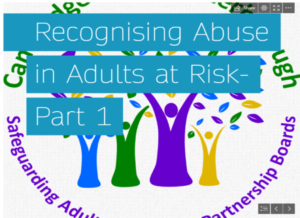
Introduction to Safeguarding Adults (Part 1) – Recognising Abuse in Adults at Risk
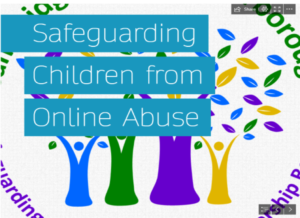
Safeguarding Children from Online Abuse (Part 1)
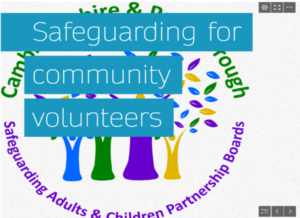
Safeguarding for Community Volunteers
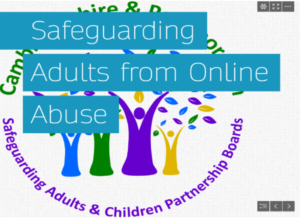
Safeguarding Adults from Online Abuse
Future Learn/Health Education England
Online learning packages (Level 3) developed by Health Education England
Available at: https://www.futurelearn.com/courses/level-3-safeguarding-adults/1
E- learning for health
Health Education England (HEE) has worked with subject matter experts to develop a set of high quality, national resources for Levels 1-4.
Available at: https://www.e-lfh.org.uk/programmes/safeguarding-adults/ps://www.e-lfh.org.uk/programmes/safeguarding-adults/
Webinar/Podcasts
Safeguarding adults training webinar series by the Social Care Institute for Excellence (SCIE) https://www.scie.org.uk/care-providers/coronavirus-covid-19/virtual-courses/safeguarding-adults-training-webinar-series
Weekly from 6th May to 10th June – 1 hour sessions 1300-1400hrs
Topics: What is Safeguarding? / Making Safeguarding Personal / Information Sharing in Safeguarding / Safeguarding and Human Rights / s42 Enquiries for Providers / Self-Neglect and Safeguarding
National Mental Capacity Forum will be hosting a webinar to discuss specific challenges in the COVID 19 period on 28th April @ 4.30pm You need to register prior to attending here: https://essex-university.zoom.us/webinar/register/WN_jqZTQmgvRwmcFTw-8EVT5A
The Children’s society
1 hour e-learning package focusing on young people’s real experiences about what it’s like to be an abused or exploited child with ‘something to tell’.
Available at: https://learning.seenandheard.org.uk/
The Royal College of Paediatrics and Child Health
Host of Safeguarding learning resources e-learning free for non-members just need to register
Available at: https://www.rcpch.ac.uk/resources/safeguarding-learning-resources
MindEd- elearning to support healthy minds
A selection of e-learning focused on mental wellbeing produced in affiliation with Health Education England and E-learning for Health Available at: https://www.minded.org.uk/catalogue/TileView
Webinars/ Podcasts
National Child Mortality Database
Webinar featuring new guidance on Joint Agency Response (JAR) to child deaths during COVID 19
Available at: https://www.ncmd.info/2020/04/07/webinar-7-april-2020/
Emerging Minds
Webinar hosted by Professor Cathy Creswell (University of Oxford) and Dr Polly Waite (Universities of Oxford and Reading) and Professor Helen Dodd (University of Reading) In the time of COVID-19, how we can best support children and young people with their worries? What does research tell us?
E-Learning for Health
Safeguarding Children Levels 1,2 and 3 as per intercollegiate document other specific training on suicide prevention and child sexual exploitation also available.
Available at: https://www.e-lfh.org.uk/programmes/safeguarding-children/
Royal College of GP’s
Online safeguarding learning resources and teaching for both adult and children.
Available at: https://www.rcgp.org.uk/clinical-and-research/safeguarding/training-resources.aspx
Institute of health visiting
E-learning modules on a range of safeguarding topics including domestic abuse and slavery, Safeguarding and Child Safety. Aimed specifically for health visitors and midwifes.
Available at: https://ihv.org.uk/for-health-visitors/resources/e-learning/
Cambridge and Peterborough Domestic Abuse and Sexual Violence Forum
Level 1 training aimed at staff requiring basic knowledge of domestic abuse Available at: https://www.cambsdasv.org.uk/website/elearning_modules/92616
Preventing Radicalisation Basic Prevent Awareness, for Level 1 and 2. Available via: https://www.e-lfh.org.uk/programmes/statutory-and-mandatory-training/
Preventing Radicalisation – Awareness of Prevent Level 3 (Equivalent to WRAP Workshop to Raise Awareness of Prevent) and Preventing Radicalisation (Awareness especially in the context of Mental Health) Level 3 Available via: https://www.e-lfh.org.uk/preventing-radicalisation-mental-health-level-3-e-learning-module-now-live/
Produced by Waltham Forest
Available at: https://youtu.be/HHQG8CJROhU
